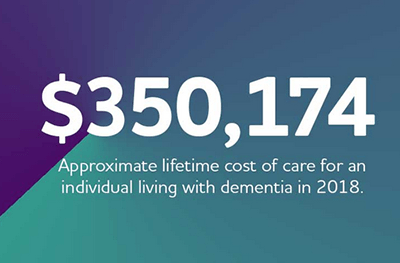On the Long Road for Alzheimer’s Hope

Country star Kenny Chesney sung lyrics that many people can relate to today. In his 2012 hit "While He Still Knows Who I Am" Kenny sings this lyric:
Mama says he can't remember
Daddy thinks that he still can
I'm going back to see him
While he still knows
Who I am
 You can hear the song here: https://youtu.be/bKH13qpFhv8?t=2
You can hear the song here: https://youtu.be/bKH13qpFhv8?t=2
Many of us know first-hand how we felt when we learned Mom or Dad was diagnosed with Alzheimer’s or another type of dementia. Researchers are working hard to find treatment, cure, or prevention of this disease.
A major drug company has just ended its clinical trials of a once-promising drug treatment for Alzheimer’s. Biogen, Inc., a biotechnology company based in Massachusetts and Eisai Company, a Japanese pharmaceutical company, announced they halted the phase 3 trials of the drug aducanumab. This drug was intended to slow the progression of Alzheimer’s by targeting beta-amyloid proteins beta-amyloid. This protein is a sticky compound that accumulates in the brain. According to the Alzheimer’s Association, it is thought to disrupt the communication between brain cells.
According to the two companies, their interim analysis, which was conducted by an independent monitoring committee, concluded that aducanumab was not likely to help Alzheimer’s patients when they compared those on the medication with those taking the placebo.
This is yet another drug which failed as researchers look to find a cure or treatment for those who suffer from Alzheimer’s and dementia. Cognitive decline is a growing problem in the United States and around the world. Every 60 seconds the Alzheimer’s Association says someone in the U.S. develops Alzheimer’s. The cost of long-term care services and supports and other related health issues due to Alzheimer’s and other dementias have a substantial impact on American families and taxpayers. The Alzheimer’s Association says it is one of the costliest conditions to society. Many of the caregivers are unpaid family members. This places a big burden on these people who have careers, families, and responsibilities on top of their caregiving role.
This news is sad but imagine if you were suffering from Alzheimer’s today. One such person is Phillip Gutis. He was participating in this drug trial. In a piece he wrote in the New York Times he admits the research would have unlikely benefited him but it still gave him hope. The news was very disappointing for him but it is yet another mile marker on the long road to a cure or treatment for a condition impacting so many American families.
While many people remain unhappy with pharmaceutical companies, the huge amounts of money being spent on research will someday produce results. With advances in medical science, longevity creates many challenges that we face as human beings. The only thing we can do is hope, pray, and plan. When planning for the financial costs and burdens of aging you aren’t preventing dementia and other health issues from happening. They will. You can plan and avoid the crisis otherwise placed on your family and finances due to long-term care.
Many people think the easy thing to do is wait and worry about it if and when it happens. The fact is most families will experience a long-term care situation. Dementia is one of many reasons people require help with normal living activities or the supervision required due to cognitive decline. The pressure on the family is more than you can imagine unless you have already experienced it. Caregiving is not easy on anyone, including the professionals. When you pay for your own care it will start to wipe out your hard-earned savings. It also negatively impacts income and lifestyle.

Just like planning for retirement, planning for long-term care should happen before you retire. Thus us when you will have access to the most affordable options. There are several types of products available. The most common is Long-Term Care Insurance. These affordable policies provide you with resources to pay for the type of care you want and where you want to receive it. In most cases, your care will start in your own home. Often, it ends at home. Long-Term Care Insurance can help you avoid a nursing home by providing you access to this proper care services right when you need it. Unfortunately, facility care may be required. Memory care options exist at assisted living facilities and nursing homes.
Long-Term Care Insurance will pay benefits for all levels of care at home, adult daycare centers, assisted living facilities, memory care facilities, and nursing homes.
In addition to tradition insurance, asset-based or “hybrid” policies exist. These are basically a life insurance policy or annuity with a rider for long-term care services. The big selling point is you are guaranteed to receive money either in the form of a tax-free long-term care benefit or in a tax-free death benefit. These have become popular but be careful. Many of these policies require you to be terminal. If the policy does not say “long-term care” then avoid it.
Many states offer limited benefit plans, usually home care policies, which are available to a wider group of people. For some, this may be an affordable way to help the family help you.
Experts recommend working with a qualified Long-Term Care Insurance specialist who represents the major insurance companies. You can find a specialist by clicking here.
Start your online research be finding the current cost of long-term care services and supports in your state. You can see that information, along with the availability of partnership policies and tax-incentives by locating your state on the LTC NEWS map. Find your state by clicking here.
Do yourself and your family a favor by planning in advance for the challenges presented by getting older. It is easier and much more affordable to plan and not place your family into crisis mode. Despite what you might read, most people find Long-Term Care Insurance very affordable. Plus, you custom design the plan. Insurance is never fun to buy but at the time of claim, your family will love the fact you did.


